RadiaLx2008 - New and forgotten ways of making
radio :: From sept. 20th till sept. 28th the city of Lisbon (Portugal)
is receiving the manifold waves that will be emanating from RadiaLx,
a biannual radio art festival.  Among
the participants, there's Anna
Friz, Framework's
Patrick McGinley, regular Raudio
contributor Jay Needham, Paulo Raposo, etc ... The Lisbon
conferences, workshops, concerts ... are accompanied
by an 8 days long 24
hours audio webstream with a wealth of as of yet un-heard - new and
forgotten - radio. Among the RadiaLx streamed pieces are last
year's 'Back to Berlin' and the first two of my 'radio-dictaphonic'
pieces around the Tuned
City festival, in Berlin earlier this year ... :
Among
the participants, there's Anna
Friz, Framework's
Patrick McGinley, regular Raudio
contributor Jay Needham, Paulo Raposo, etc ... The Lisbon
conferences, workshops, concerts ... are accompanied
by an 8 days long 24
hours audio webstream with a wealth of as of yet un-heard - new and
forgotten - radio. Among the RadiaLx streamed pieces are last
year's 'Back to Berlin' and the first two of my 'radio-dictaphonic'
pieces around the Tuned
City festival, in Berlin earlier this year ... :
TunedCity 1 - Jetzt, erst jetzt ... Neuköln ::
("After the war," one of the ladies said, "we would have cried if our
mothers had sent us out into the street wearing trousers like that !")
TunedCity 2 - Some Sounds Are Like Shadows ::
More about Tuned City, das
kleine, Berlin & Neuköln in the SoundBlog soon ...
Also part of the Radialx2008 audiostream: The Natural History Museum
of Sound, including the 16th
rendering of Vicky's Mosquitos ...
Click
here for a pdf-file with the full RadiaLx2008 streaming schedule ...
13 min read 🤓
Souvenirs de vacances_("Hear what you think !")
september 22, 2008.
While on the outsides raged a very wet summer storm and a great many inside-tellies showed the mega(lo) exercises in simultaneity as they were performed during the opening ceremony of the Beijing 2008 Olympics, I had tea at Rod Summers' house. Rod Summers is a british audio artist who has been living in the dutch town of Maastricht for the most part of his life. We talked about sound, art, music, and Rod told me about his career that by now has been going for more than thirty-five years. In those years Rod created (and curated) a large body of sound work, the bulk of which he released himself, independently, in numbered limited editions. First on audio compact cassettes, and later on CDrom, as soon as the use of that digital medium became available for home use, and CD-writers could be bought at affordable prices: he firmly believes that an "artist is obliged to consider whatever technology is available". All works are meticulously documented in his private archive. It was with amazement that I riffled through the copybook in which for each one of his edited works he notes on what date which numbered copy has been given or sent to whom ...
Rod Summers was born in the UK, in the very middle of the second world war. When he was seventeen years old, he left the village of Verwood, where he spent his youth, and joined the Royal Air Force as a medic. Not much later he bought himself a portable tape recorder, with money saved from his first salaries. And began recording.
He got to know Maastricht in the beginning of the 1970s, when for some time he was stationed not far from there, at the Joint Operations Center, the war headquarters of NATO's 2nd allied air force that in those years of cold war was housed in the underground limestone quarries - in Limburg these are called 'de grotten' (the caves) - of the Cannerberg. He returned to England, but only for a short while. Rod quit the army, and in 1973 came back to Maastricht to study art at the Jan van Eyck Academy. He has been living there ever since.
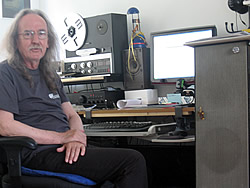 |
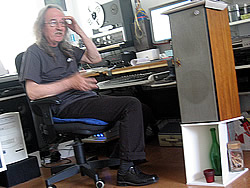 |
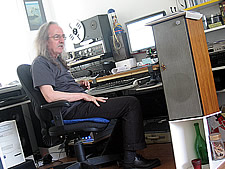 |
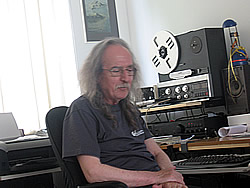 |
From the very beginning 'sound' was the material that Rod worked with as an artist. 'Audio art', quite naturally, became his subject.
On the Maastricht Moet Je Horen audio-website, a site filled exclusively with audio-articles (reportages, interviews, music ...) about all that one way or another is related to life in and around the town of Maastricht, there is a long and instructive interview with Rod Summers, in which he talks about his Werdegang, his philosophy, and his past and current work ...
Much of this goes under the label of VEC. Pronounced as in the french "vie ici", VEC is an acronym that besides for Visual, Experimental, Concrete may be taken to stand for a great many other word triplets. Around 1973 Rod became active in the mail art network. Combining the idea of mail art with working in audio, he started to exchange sounds with others by the mail, using compact cassettes, which eventually gave rise to the VEC Audio Exchange Program. The VEC AEP is documented in a series of 16 limited edition cassettes, that were produced by Summers over a period of five years - between 1978 and 1983 - and which each consist in a compilation of the audio that he received from artists from all over the world, in exchange for a copy of one of the VEC Audio Exchange Cassettes - one of the programs. ( * )
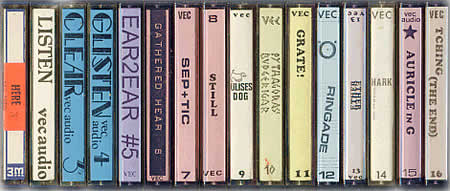
I only learned about this series of 'art-sound / sound-art' cassettes, compiled thirty years ago when a couple of months ago Maastricht Moet Je Horen began publishing the VEC Audio Exchange cassettes in bi-weekly episodes. The complete series can also be downloaded from the VEC website, that - apart from the VEC Audio Exchange part - is still mostly under construction.
The 16 cassettes form a fascinating chapter in the history of mail art and cassette culture. They contain about 400 contributions by some 200 different persons and collectives worldwide, and its content sums up to 16 and a half hours of sound, art, music. Each cassette is conceived as, and can be listened to as a program: a radio-program. Some of them actually include announcements of titles and artists; but not all, though each cassette indeed might have been a program produced for one of the more adventurous (free/pirate) radio stations active in those days; and they still are - programs, I mean. Someone should present them as such, on one of the more adventurous radio stations that (still) exist and are active today ...
It is of course not by accident that the period in which the VEC AEP ran, corresponds precisely to that of the 'experimental explosion' that characterizes the 'off-main stream' pop music between roughly 1977 and 1983, and that musicologists since have come to baptize post-punk experimental pop (PPEP - ** ). The way in which each individual one of the included pieces came about, the how and where the 'tracks' were recorded, the way these recordings then were brought together, and the way in which the items in the series were produced and then published ... all are as many expressions of what made the sudden (relatively) massive urge for extra-academic sonic experimentation by (mostly young) musicians, visual artists and other misfits in those years (often literally) tick 'n' click. It is because of its continuity, and the regularity of its editions over a period of five years, that the VEC AEP sketches an interesting and multifaceted audio-portrait of its times ...
The series originated in the world of artists experimenting and working with the possibilities of recording and manipulating audio using the technologies that in the course of the 1970s became widely available: relatively cheap reel-to-reel recorders, cassette recorders, mixing equipment, microphones ... And sound effects, like the divers types of echo-units and reverberation boxes, the abundant use of which is typical of much of the 'home recording' from the PPEP-days. Several generations of recording artists and musicians let themselves be seduced to 'throw in', almost by default, the boxed effects delivered by cheap echo-'chambers'. There is surely an interesting psychology to uncover behind the fascination displayed by sound makers for echoing sound. It is, I think, not only due to the fact that the echo machine 'rhythmitizes' - and hence 'musicalizes' - whatever sound you feed it. (Some 'genres' or 'types' of music, like dub or frippertronics, are typically constructed around the 'rhythms' induced by the delay time of an echo set-up. I suspect that in later years with the advent of sampling devices the possibility of the looped playback of samples was an alternative offering more flexibility and control, that therefore rendered the use of echo machines - an echo of course is the fade-out of a looped playback - less 'urgent'.) But anyway, this of course is but a guess. Might be a starting point for a paper. So if you have to write one and need a subject ... :-) ... It is interesting to note that in the first as well as several of the other works on the first cassette in the VEC Audio Exchange series, echo effects play a prominent role.
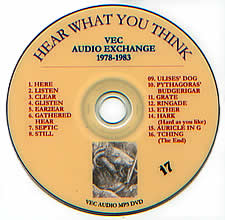 Summers
started the VEC AEP as a way to get familiar
with the audio work of artists worldwide. In the earlier editions there
is an emphasis on 'arty' vocal pieces, recordings of performance-art pieces
and (sound) poetry, much in the spirit of Dada
and Fluxus.
There is ritual, there are field recordings. Typical are the numerous
vocal works - some clearly 'conceptual', others not (really) - that involve counting,
word repetitions, the reading of lists of things ... Some examples that
particularly intrigued me : a short recording by Leonard Frank Duch (Brazil),
who - on the first side of "Clear", the third in the series, can
be heard shouting, repetitively and desperately: "I am an artist !".
In the background there is the loud, agitated talking / discussion of a
group of ... women ? children ? ... a 'discussion' that seems to bear no
relation to Leonard's shouting; his persistent cry-out is simply being ignored,
thus accounting for its desperation ... ; Nic Thompson's "Rejection
slips", which can be found on the seventh cassette ("Septic")
consists in the reading out of the rejection letters that he received in
answer to a long series of applications for a multitude of jobs ....; and
a lot more in a related spirit ...
Summers
started the VEC AEP as a way to get familiar
with the audio work of artists worldwide. In the earlier editions there
is an emphasis on 'arty' vocal pieces, recordings of performance-art pieces
and (sound) poetry, much in the spirit of Dada
and Fluxus.
There is ritual, there are field recordings. Typical are the numerous
vocal works - some clearly 'conceptual', others not (really) - that involve counting,
word repetitions, the reading of lists of things ... Some examples that
particularly intrigued me : a short recording by Leonard Frank Duch (Brazil),
who - on the first side of "Clear", the third in the series, can
be heard shouting, repetitively and desperately: "I am an artist !".
In the background there is the loud, agitated talking / discussion of a
group of ... women ? children ? ... a 'discussion' that seems to bear no
relation to Leonard's shouting; his persistent cry-out is simply being ignored,
thus accounting for its desperation ... ; Nic Thompson's "Rejection
slips", which can be found on the seventh cassette ("Septic")
consists in the reading out of the rejection letters that he received in
answer to a long series of applications for a multitude of jobs ....; and
a lot more in a related spirit ...
The first actual new wavy (pop)song is on the third cassette ("Clear"). The track is called "I don't want to hold you", and it's by the american Los Microwaves. From then on a growing number of samples of home-recorded new wave and PPEP-tunes begin sneaking onto the VEC Audio Exchange cassettes. Thus the mix of (sound) art, improvisation, & experiment in later programs includes more and more examples of typical 1980s alternative pop (some - unavoidably - featuring that graveyard-like doom-way of male singing, that often addresses highly serious matters concerning the individual and its relation to the whole, but which some thirty years later appears as disproportionately pathetic, and grotesque) ... Also the more radiophonic and audio-arty tracks increasingly integrate the electronic sounds from the synthesizers and rhythm boxes that were so en vogue with the young and aspiring new wave musician-artists of the period ... It is thus that the VEC Audio Exchange series nicely illustrates the large overlap and entanglement of the world of PPEP with that of 'avantgarde' (or maybe I should say: young) art in the late 1970s / early 1980s.
In 1983 the fruitful and dynamic bloom of PPEP came to a sudden halt. In his thesis "British Post-Punk Experimental Pop (1977-1983)" (pp. 65-66), Martijn Voorvelt writes: "The cultural and political climate in the UK circa 1983 was such that few collectives could survive or reach an audience. [ ... This] disappearance of experimental collectives coincided with the decline of experimentalism in general [, ... and] experimentalism ceased to be a force of major importance." Also the VEC AEP calls it a day. That is in september 1983, with its 16th edition: "Tching". The reasons for this as given by Rod Summers ( *** ) quite remarkably echo Voorvelt's observations. "The project outran my meager resources," Rod writes, "both cassette decks and the master tape recorder wore out from excessive use. I had no income and got no financial or moral support from any government or institution. I was not in a position to replace the dilapidated equipment, and just too many of the cassettes that were coming in were of very poor quality, most amateurish, home-music ..."
_Art de Rien_
It was a funny coincidence that shortly after my visit at Rod's in Maastricht, followed by
many hours of listening to the VEC AEP 'mail audio art', I found an invitation
to the opening (sept. 4th, 2008) of Souvenirs de Vacances, un hommage au Mail Art,
an exhibition at the parisian gallery Art
de Rien.
For this 'tribute to mail art', instead of artists sending works to artists, Art de Rien
invited artists to send in works by mail to the gallery:
their Souvenirs de Vacances. In the months july and august of this year Art de Rien
received more than 1000 items of art-mail from over 150 artists world-wide from beginning of july until
the beginning of september, and used them to colorfully cover the walls of the gallery, in the rue d'Orsel, Paris XVIII.
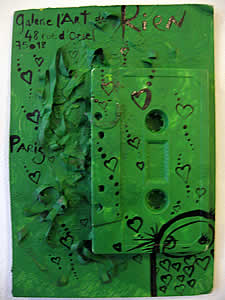 |
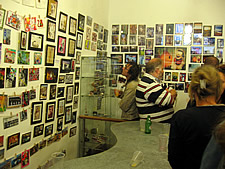 |
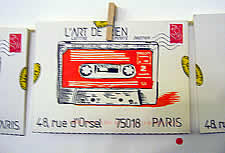 |
Though a couple of unusual items came in by mail - like a stamped and
addressed crushed plastic bottle - most were of a more or less standard postal format.
As far as I can know, there was no sound sent in by mail ... I found two cassettes though
on the walls, and I
dare say these are the only ones, as I carefully checked during
the opening.
You can see them in the pictures above.
I do not know who made them.
One of them is just a drawing.
But I do like the green one, which - as you see - has a real
cassette glued to it ... So there is a chance that actually this
work of mail-art does involve an audio part. Maybe the artist did record
something on it before (s)he (the little hearts make me think that it's
a she-artist's work, but then the green somehow feels
masculine ...) sent it to Art de Rien ...
Maybe.
Artist, if by chance you ever come across this page and read these lines, do let us know ... ;-) ...
[ Souvenirs de Vacances; un hommage au Mail Art continues in Art de Rien, 48 rue d'Orsel, Paris XVIII, until october 4th, 2008. ]
notes __ ::
(*) Here are the original 'rules of the game', as sent out by Rod on
the mail art network in 1978 : "The intention of the VEC AUDIO EXCHANGE is to inform artists
working with the medium audio about the contemporary situation. A mastertape programme is
compiled by copying extracts from audio works received onto open reel tape which is then
edited to fulfil form and time requirements. Realtime cassette copies of the mastertapes
are made one at a time to order up to a total edition of 150. Four different programmes are
published annually, each one featuring the works of approximately twenty artists.
THE PROGRAMMES ARE AVAILABLE BY EXCHANGE.
ONE PROGRAMME IN EXCHANGE FOR AN AUDIO WORK FROM YOU. Your cassette or tape will
NOT be returned but will be included in the archive. If TECHNICALLY POSSIBLE an extract of
UP TO six minutes of your work will go onto the following programme. In exchange for the audio
works you send you will receive a copy of the latest programme unless you specify otherwise.
Once an artist has a work in the archive the other programmes are available to him/ her
in exchange for blank cassettes OR new works OR $3 (cassette+postage) per programme.
The VEC AUDIO EXCHANGE is a non-profit making, non-subsidised, artist initiative.
25 copies of each programme are for sale at $10;f20;DM20 per copy." [
^ ]
(**) See e.g. Martijn
Voorvelt's thesis: British post-punk experimental pop (1977-1983),
Leeds University 1998. In a recent paper with Rébus - Electroacoustic
improvisation as metalanguage and fixed point (i) (to appear) - we
observe that most of the current practices of EAI
find their origin there, and are indeed, without the shadow of a doubt,
the continuation (the here and the now) of much of what characterizes the
practices of post-punk experimental pop music in the western europe of the
late 1970s and early 1980s. [ ^ ]
(***) In a mail-interview
with Ruud Janssen, from 1995. [
^ ]
tags: mail art, Maastricht, Paris, cassettes, post-punk experimental pop
# .276.
comments for Souvenirs de vacances_("Hear what you think !") ::
|
Comments are disabled |